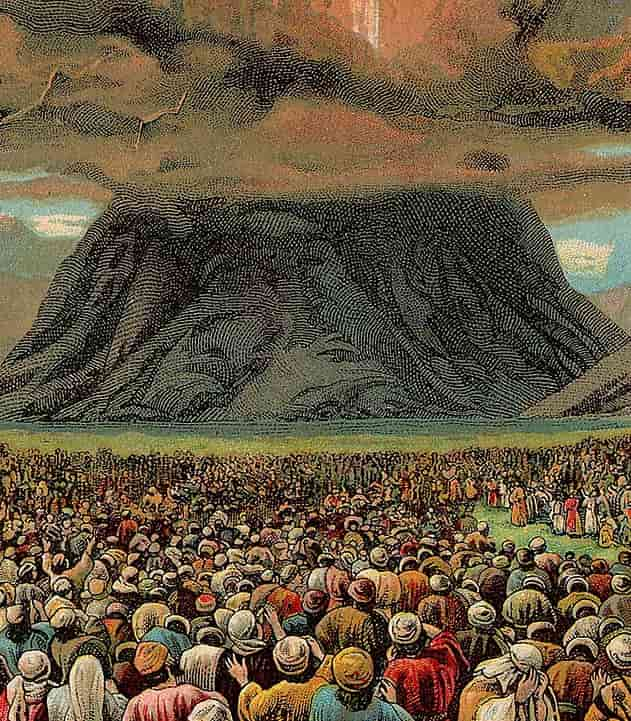
Concepts, not Commandments
The famous term “Ten Commandments” is a misnomer. In the three references in the Torah to what we call the Ten Commandments, one term is used: עשרת הדברים – the Ten Concepts.
ויכתוב על הלוחות את דברי הברית, עשרת הדברים
He [Moshe] wrote on the tablets the words of the covenant, the Ten Concepts (Ex. 34:28)
ויגד לכם את בריתו אשר צוה אתכם לעשות, עשרת הדברים
He told you of His covenant which he commanded you to follow, the Ten Concepts (Deut. 4:13)
ויכתוב על הלוחות כמכתב הראשון את עשרת הדברים
He [God] wrote on the [second] tablets, as the first writing, the Ten Concepts (ibid. 10:4)
Those are concepts and not commandments because the first and the last items of the covenant cannot be commandments. The first is a statement:
אנכי ה’ אלקיך אשר הוצאתיך מארץ מצרים
I am YHWH, your God, who took you out of Egypt
The last one is a promise:
לא תחמוד… כל אשר לרעך
You will not covet… that which belongs to others.
Promise of Joy and Peace
The promise of the Ten Concepts is as follows:
· Understand and cherish your personal relationship with God, who gave you freedom.
· Do not adulterate or limit that relationship by making physical, limited images to represent God.
· Do not abuse the relationship by claiming to speak in God’s name.
· Cherish your relationships with your parents, and by extension, your family.
· Allow yourself to enjoy the gift of Shabbat, together with the whole nation, thus acknowledging the importance of freedom.
· Do not infringe upon others’ rights. Protect their life, their relationships, their possessions, and their right to fair trial.
Once you have accomplished that, you will be able to appreciate the basic gifts we all share as humans and to respect the rights of others. That, in turn, will guarantee that you will not covet what does not belong to you.
To achieve that state of mind is to have the greatest joy possible. As our sages have commented:
איזהו עשיר? השמח בחלקו
Who is truly wealthy? One who is happy with his lot.
Envy and jealousy are the causes of all strife and misery in the world, on a personal, national, and global level, so this promise of the Torah should not be taken lightly.
I have explained this interpretation in detail elsewhere. Here, I would like to focus on the first two concepts, starting with this question:
Why does God consider it so important that we recognize Him as God and that we do not worship idols to the extent that He would be jealous if we did?
Personal God
Let us look at the first concept:
אנכי יי אלקיך אשר הוצאתיך מארץ מצרים מבית עבדים
I am YHWH, your God! [I] have brought you out of Egypt, of the house of bondage.
This statement, as is the rest of the covenant, is addressed to an individual and written in the singular. God speaks to the Israelites as a nation, yet He addresses each one of them individually. The covenant is about the importance and the uniqueness of the individual. It emphasizes the personal relationship each one of us has with God, a relationship which is a product of the way we perceive ourselves.
The idea of a personal God is a recurring motif in the bible. It is evident in the narratives of those who sought God or were chosen by him, but it emerges more powerfully in the stories of those who tried to hide from Him, even if only momentarily. They have discovered that the Image of God, embedded in humankind at creation, is a spiritual GPS chip which accompanies us wherever we go. Even when you try to drive God away, even when you run to the most remote corners of the world, you are not alone! YOU are there, and if you are there, God is there as well.
You Can Run
The first fugitive is Adam:
…Adam and his wife hid from God amongst the trees of the garden. God called out to Adam, saying, where are you? Adam said, I heard Your voice in the garden and I was filled with fear for I am naked, so I hid… (Gen. 3, 8-10)
Adam is hiding because he has lost something he held precious. His relationship with God. He feels that he has been stripped naked, that he lost what he had because of his error. God calls out to Adam to remind him that they can still talk, even if it is to accept responsibility for the wrongdoing. Adam, forefather of humanity, thus learns to reclaim his dignity and face his demons, empowered by the divine spark in him.
Another famous fugitive is Jonah. After Jonah is thrown to the sea and swallowed by a fish, he speaks of his failed attempt to run away from God and from himself:
I thought I had exiled myself from your sight, but I still gaze at Your sacred temple… when my soul withdraws into itself. I remember You, and my prayer comes to You, to Your sacred temple… (Jonah 2:5)
Jonah tried to exile himself, to drive himself away from the presence of God. He uses the same root which describes Adam’s exile from the Garden of Eden – גרש. But he still gazes, as his soul withdraws into itself in the belly of the fish, at the sacred temple. He is the only one there, in the darkest, narrowest, most horrific prison, the belly of the fish at the bottom of the ocean, and yet there is someone in the room with him. It is Jonah himself. He is still connected to God and can still have a dialog with him. Eventually, he emerges from his living prison cell.
Running From God Towards God
The last biblical figure is David, who spent many years as a fugitive from King Saul, but who also reveals in Psalm 139 (7-12) that he has contemplated running away from God:
How can I escape Your spirit? How can I avoid Your presence? If I rise to the heavens, You are there, I go down to the netherworld, I face You. [Even if] I soar on the wings of dawn, I dwell at the far end of the ocean, there also Your hand will guide me, Your right [hand] will hold me. I thought that darkness could cover me, that night could be my day, but darkness, for You, is not dark, the night shines as day, darkness is light.
Rabbi Shelomo ibn Gevirol put it succinctly in his Keter Malkhut (chapter 38):
אברח ממך אליך
I ran away from You to You!
You are Unique
Going back to the first of the Ten Concepts, we can say that God tells each individual that the Exodus has granted him the power to be unique and to develop his own relationship with God, without being subjugated to any other human being. This does not mean that one could do whatever he wants with disregard for others. That is why we have the other concepts. We tend to think of the second half of the Ten Concepts as the one protecting the rights of others, but that idea is there from the very beginning. The individual divinity of each person is a manifestation of the idea of the Image of God. As we appreciate the Image of God in us, we understand that all humans are created in the Image of God. Therefore, all humans must respect and protect each other.
You and God
That idea is also at the core of the prohibition against idolatry. God’s “jealousy” does not stem from selfish considerations but rather from His concern for humanity. Paganism is a pretext for doing as you wish, including the greatest evils, in the name of religion. When there is a pantheon of competing and quarreling gods, one can always choose sides. In stories such as the Iliad, one god supports the Greeks while the other fights with the Trojans. Paganism also allows people to craft their gods in their own image and then ask these gods to guide them. Thus, they make themselves gods and invent religions to live and kill by. This system, which the Israelites found very hard to abandon, could lead to the destruction of humanity. God uses such harsh language here and throughout the bible, not because paganism is a threat to Him, but because it is a threat to humanity.
This is also the reason for the prohibition against making images. God is the Creator, He is omniscient and omnipresent, and our perception of Him changes constantly in accordance with our experience and stage in life. Similarly, us humans, created in His image, possess something of these qualities. Making a carved or molten image confines the Divine Image into limited physical objects with clearly defined boundaries. By creating molten or carved images, we limit ourselves.
In the first two of the Ten concepts the Torah teaches us to appreciate freedom, explore our potential, and remember our commitment towards all humankind.
Questions for Kids: Parashat Yitro
After the Israelites left Egypt, all the nations around them heard about the miracles and the parting of Yam Suf.
- The Torah only mentions that Yitro heard. Why is it special?
- Yitro was the father of _____________, the wife of _____________ .
- Gershom and Eliezer were Moshe’s __________.
- What was the good advice that Yitro gave Moshe?
- The Israelites walked for a while in the desert. In which month did they arrive at Har Sinai?
- Who spoke with Moshe from Har Sinai?
- What did the Israelites say when they heard that they are going to receive the Torah?
- They prepared for Matan Torah for how many days?
- What did they do during those days?
- On the third day the Israelites stood around Har Sinai. What did they see and hear?
- How many commandments did the Israelites hear at Har Sinai?
- The Israelites were afraid of the sights and the strong sounds on Har Sinai? What did they ask of Moshe?
- What is the difference between the first five and the last five commandments?
- Why does “Honor your father and mother” belong to the first five commandments?
- Can you say the Ten Commandments?
Answer Guide for Parashat Yitro
- Everybody heard, but Yitro was the only one who decided to join the Israelites.
- Tzippora. Moshe’s wife.
- They were Moshe’s sons.
- The advice was to appoint people to help him.
- The month of Sivan.
- HaShem.
- We will do and we will listen – נעשה ונשמע.
- Three days.
- They cleansed themselves and washed their clothes.
- They saw on the mountain clouds, smoke, and lightning, and they heard a shofar.
- Ten.
- They asked that Moshe would speak with HaShem and then tell them what HaShem said.
- The first five are between us and HaShem – בֵּין אָדָם לַמָּקוֹם, and the last five are between us and our friends – בֵּין אָדָם לַחֲבֵרוֹ.
- Because honoring our parents is like honoring HaShem.
- Check the Parasha for the answer!!!







